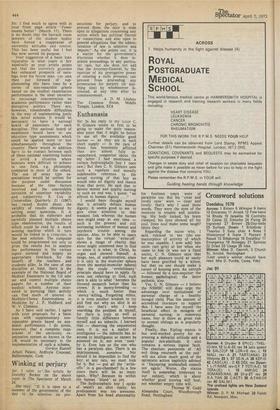Sir: I find much to agree with in your front
page article ' Fewer means better' (March 17). There is no doubt that the barrack room lawyers of the student bodies have forced a reappraisal of university attitudes and control. This has been useful but I feel has now served its purpose.
Your suggestion of a basic loan repayable in later years is fair especially as your article points out that the univers;ty gruauate has enhanced prospects of earnings over his fellow man. inc idea then put forward of supplementing this basic loan by a series of non-repayable grants based on the student examination performance is the ideal incentive to encourage concentration on academic performance rather than disruptive politics. There are, however, considerable difficulties in the way of implementing justly this latter scheme. It would be necessary to have a national board of examiners for each discipline. This national •board of examiners would have to use objective type assessments which could be applied more or less simultaneously throughout the country. There would in addition have to be contact between each of these national examining bodies to avoid a situation where honours were difficult to achieve in one field, e.g. philosophy compared to most of the others. The use of essay type examinations would be useless for the purpose under discussion because of the time factors involved and the unavoidable intrusion of examiner variability and subjectivity. R. Cox in Universities Quarterly 21 (1967) has raised doubts about the validity of results obtained by setting essay questions. It is probable that an elaborate and carefully planned multiple choice type examination, the results of which could be read by a mark sensing machine which in turn would be linked to a ccmputer, is the best solution. The computer could be programmed not only to print the results but to analyse the performance in the various topics covered and supply an appropriate feed-back for the benefit of the teachers and students alike. In the case of one discipline at least, there is the example of the National Board of Medical Examiners in the US who set and control multiple choice papers for a number of their medical schools. Anyone interested in pursuing their activity can find much of interest in Multiple-Choice Examinations in Medicine by J. P. Hubbard and W. V. Clemens.
As I have said earlier, I agree with your proposals for a basic loan with supplementary nonrepayable grants based on academic performance. I do stress, however, that a complete reappraisal of the university examination system as known in the UK would be necessary in the implementation of such a scheme.
Gordon Russell Atholl Palace, Ardfoyle Crescent, Ballintemple, Cork


































 Previous page
Previous page